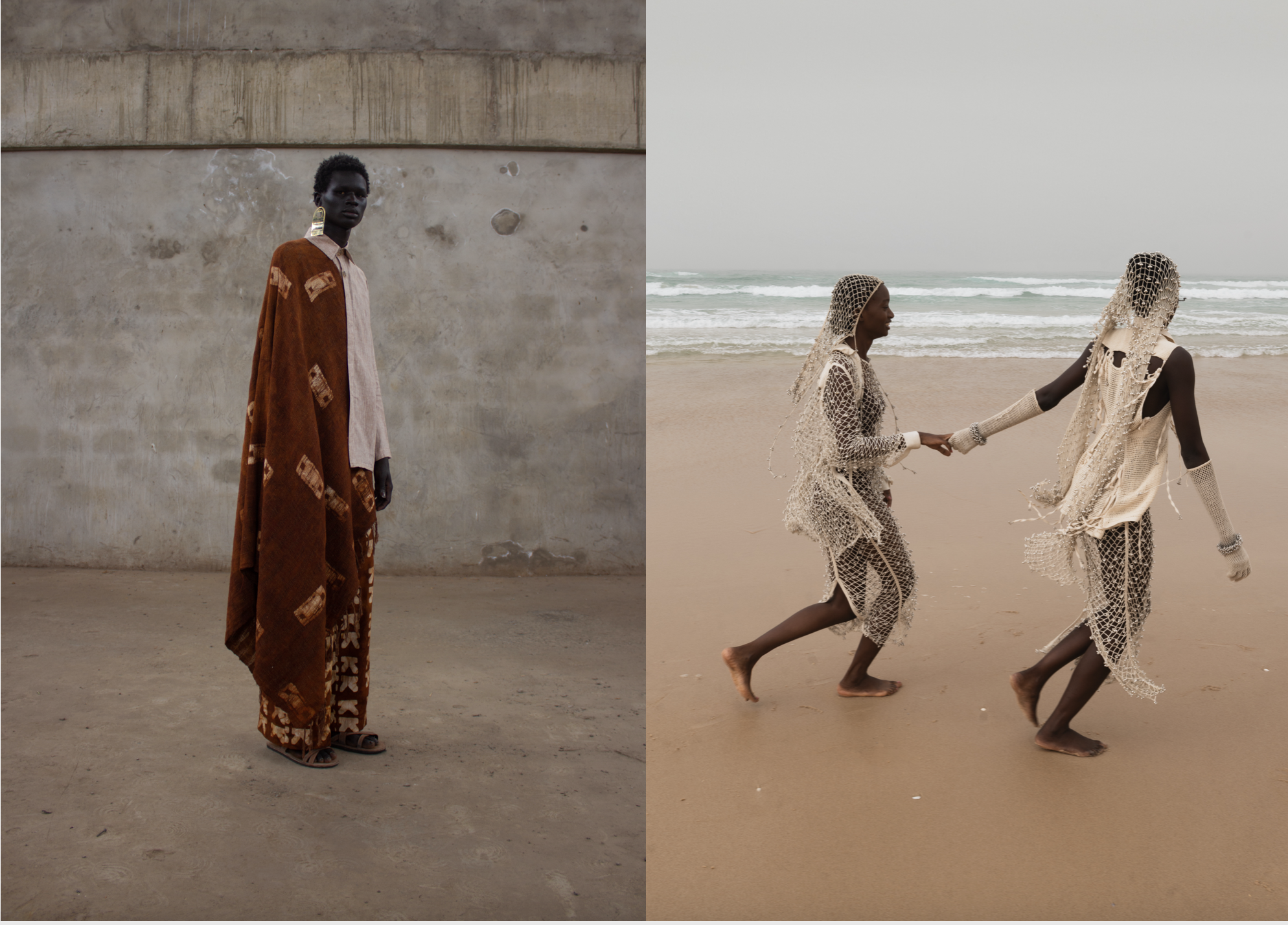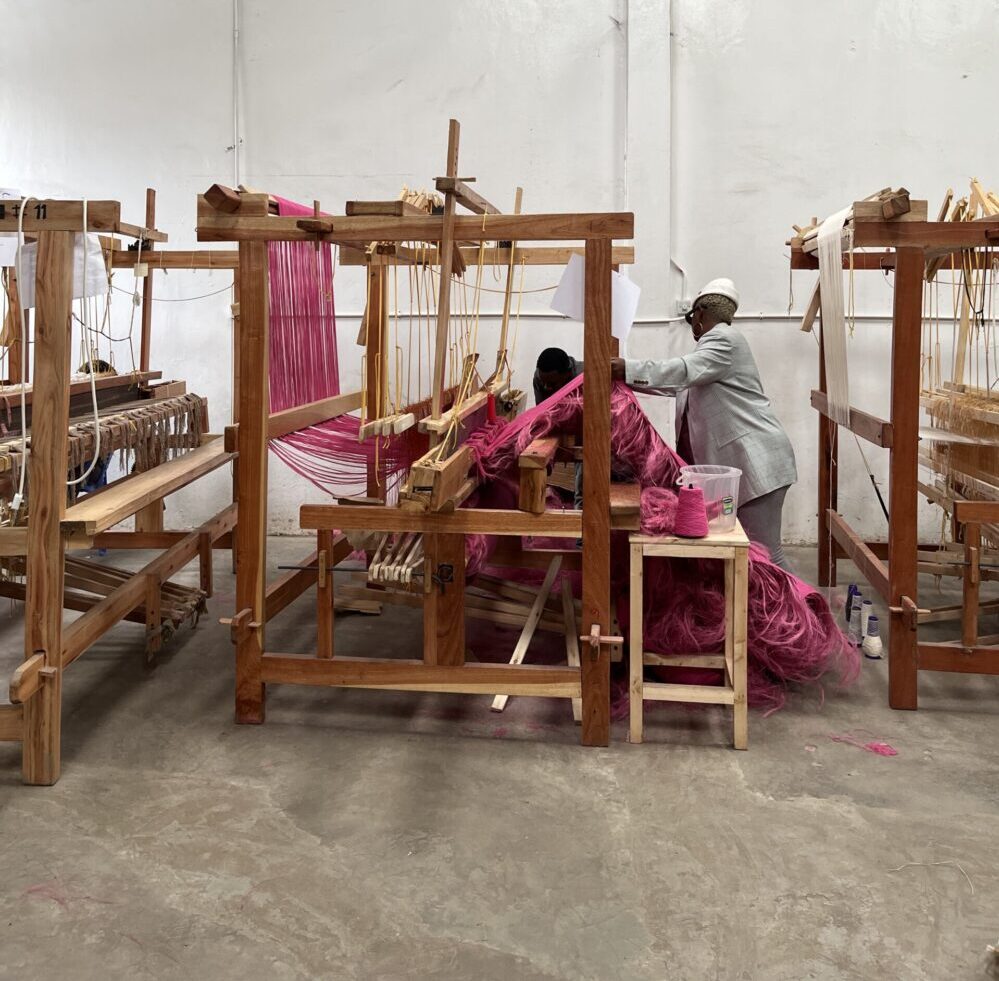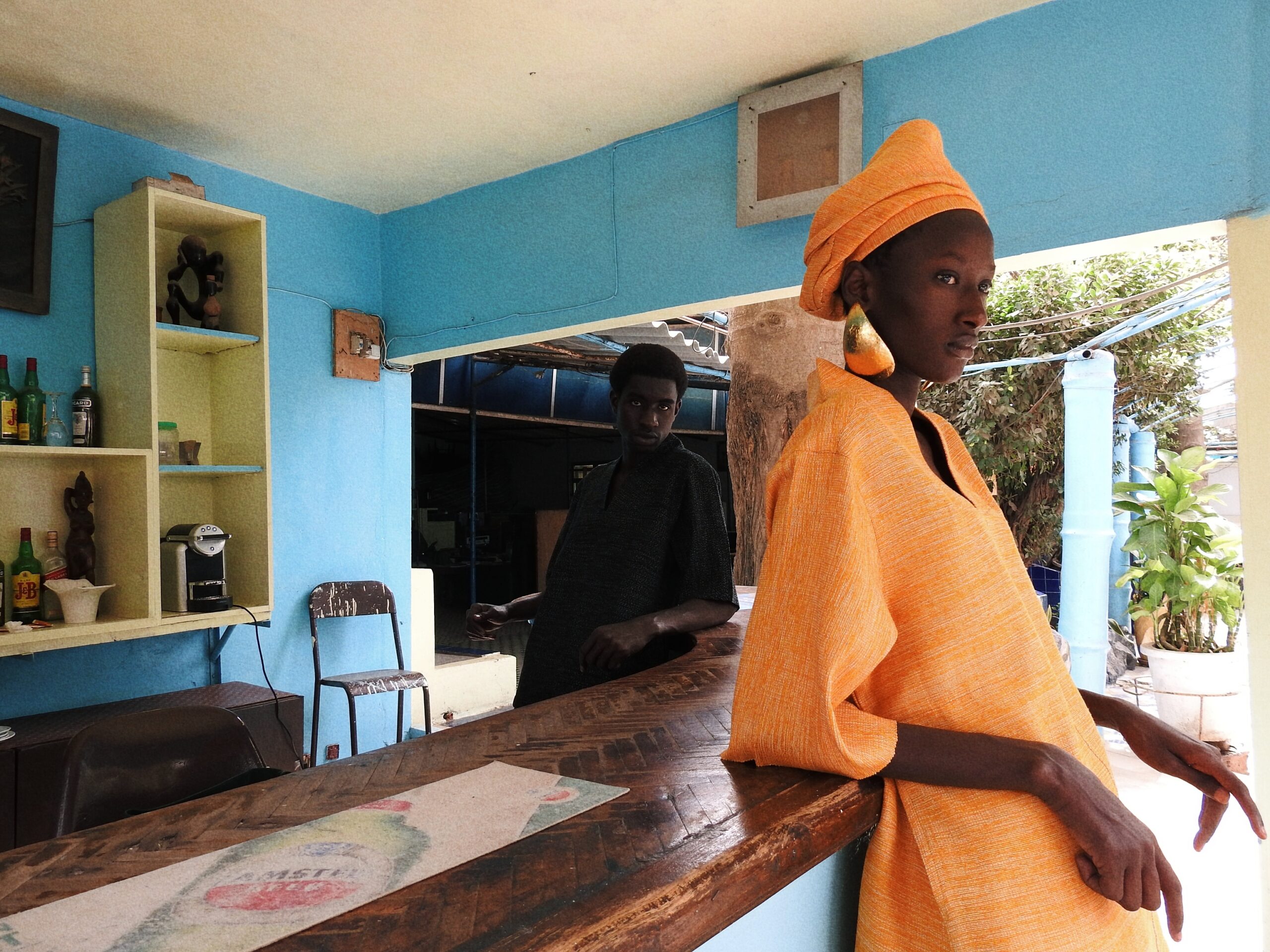The Burkinabé social enterprise draping the world in its elegant textiles
Words by Helen Jennings
The eagle-eyed would have spied Burkina Faso’s beautiful faso danfani fabric becoming increasingly fashionable in recent years, as seen in collections by designers including Laurenceairline, Studio 189, Rafael Kuoto, Asantii and Lukhanyo Mdingi. For that we have Cabes (Commerce, Artisanat pour le Bien Être Social) to thank. The social enterprise was established in Ouagadougou in 2014 in partnership with the Ethical Fashion Initiative (EFI), a programme of the International Trade Centre dedicated to building sustainable fashion practices in emerging economies. Cabes has since brought together over 90 women-led associations and 2,400 artisans across Burkina Faso and benefits its members by providing equipment, facilities and training as well as supporting sales, exports and logistics.

Burkina Faso is one of Africa’s biggest cotton producers and renowned for faso danfani, which means ‘the fabric woven at home’ in the Dioula language. “What I find powerful about faso danfani is that it is not a dead heritage or something reserved to the upper class or foreign customers. It is the pride of a nation and people wear it for special occasion as well as for everyday life,” says Oceane Joncoux, project manager at Cabes/EFI. “Weaving used to be a man’s job in the region but after Burkina Faso achieved independence in 1984, its first president, Thomas Sankara, put women to work and every home had a small loom.” Pascaline Ouedraogo, a Cabes weaver in Ouagadougou, agrees: “Fasi danfani is part of our identity. You can spot a Burkinabé from a mile away just by the that clothes he wears.”

The making process begins with acquiring the raw organic cotton from local farmers, which is ginned and spun then dyed using natural dyes, before the spooled yarn pass to the weavers. It takes up to 10 days to prepare the loom by winding, wrapping and passing 3,000 threads onto it frame using a comb. Each artisan can then weave around two metres a day, which once complete, will go through rigorous quality control. The Cabes catalogueranges from classic stripes through to checks, piqué, seersucker, ikat and houndstooth.

“Thanks to these textiles, women can care for their families, improve their living conditions and make investments”
Alongside Faso danfani, Cabes’ produces other storied West African textiles including resist-dyed indigo, koto-dunda tie-dye, bogolan mud cloth and batik. And other innovations include introducing a wider loom to broaden the commercial appeal of its woven fabrics. Little wonder then that it can count global brands such as Loewe, Wales Bonner, Vivienne Westwood, United Arrows, The Corner and Camper as clients. The draw is not only the brilliance of its fabrics but also that Cabes is committed to using GOTS (Global Organic Textile Standard) certified dyes and cottons, and applies a code of conduct based on international labour conventions and the UN’s Sustainable Development Goals. “Thanks to these textiles, women can care for their families, improve their living conditions and make investments. Also, there’s the satisfaction of knowing that their work is being sold and appreciated around the world,” says Cabes manager Karfa Yacoro.
Beyond Burkina Faso, EFI continues to support initiatives across the Global South by managing an international supply chain, identifying talent for business acceleration (past alumni include Orange Culture, Katush and Margaux Wong) and tracking results with impact assessment reporting. They currently have active production hubs in Kenya (where EFI’s first venture took shape in 2009) and in Benin and have built a network across Mali, Nigeria, Uganda, Ghana, Burundi and beyond. Its most recent project is Studio 4, a patternmaking and cut and sew workshop in Abidjan, Côte d’Ivoire. Established in 2023, it offers a space where local artisans and designers can come to train and produce, creating up to 200 jobs. And coming soon is a project centred on wool and mohair production in Lesotho.

“Artisans are what gives something the human touch, and that touch has value. It is their work that enables consumers to see where a product is made, and by whom,” says EFI founder Simone Cipriani of what drives his organisation’s endeavours. “These individuals often live and work in informal circumstances but they have incredible skills – silk screening, sewing, dying, weaving. We give them access to finance and mentoring and offer them the possibility to set up their own co-ops, which then allows for product development and the formation of an ethical supply chain… But we have a long way to go and we are only at the very beginning.”
Visit the Ethical Fashion Initiative
Die burkinische Sozialinitiative, die die Welt mit eleganten Stoffen umhüllt
„Dank dieser Textilien können Frauen ihre Familien versorgen, ihre Lebensbedingungen verbessern und investieren.“
Wer genau hinsieht, hat sicher bemerkt, dass das kunstvolle Faso-Danfani-Gewebe aus Burkina Faso in den letzten Jahren immer häufiger in internationalen Kollektionen auftaucht – etwa bei Laurenceairline, Studio 189, Rafael Kuoto, Asantii oder Lukhanyo Mdingi. Verantwortlich dafür ist Cabes (Commerce, Artisanat pour le Bien Être Social), eine burkinische Sozialinitiative, die 2014 in Ouagadougou in Partnerschaft mit der Ethical Fashion Initiative (EFI) gegründet wurde. Seitdem hat Cabes über 90 von Frauen geführte Vereine und rund 2.400 Kunsthandwerkerinnen in ganz Burkina Faso zusammengebracht. Die Initiative unterstützt ihre Mitglieder mit Ausstattung, Werkstätten und Schulungen sowie bei Verkauf, Export und Logistik.
„Was ich an Faso danfani so kraftvoll finde, ist, dass es keine verstaubte Tradition ist, sondern fest im Alltag verankert. Es ist der Stolz einer Nation – die Menschen tragen es zu besonderen Anlässen genauso wie im Alltag“, sagt Océane Joncoux, Projektmanagerin bei Cabes/EFI. „Früher war das Weben in der Region Männersache, aber nach der Unabhängigkeit 1984 förderte der erste Präsident Thomas Sankara die Erwerbstätigkeit von Frauen – bald hatte jedes Haus einen Webstuhl.“
Pascaline Ouedraogo, eine Weberin bei Cabes in Ouagadougou, bestätigt: „Faso danfani ist Teil unserer Identität. Man erkennt einen Burkinabé schon von weitem an seiner Kleidung.“
Der Herstellungsprozess beginnt mit dem Kauf lokal angebauter Bio-Baumwolle, die zunächst von den Samen befreit, anschließend zu Garn gesponnen und mit natürlichen Farbstoffen eingefärbt wird. Danach geben die Färberinnen das Garn an die Weberinnen weiter. Das Einrichten des Webstuhls ist aufwendig und kann bis zu zehn Tage dauern – rund 3.000 Fäden werden dafür aufgewickelt, gespannt und mithilfe eines Kamms sorgfältig auf den Rahmen übertragen. Anschließend webt jede Kunsthandwerkerin etwa zwei Meter Stoff pro Tag, die danach einer strengen Qualitätskontrolle unterzogen werden. Der Katalog von Cabes reicht von klassischen Streifen über Karos, Piqué, Seersucker und Ikat bis hin zu Hahnentritt-Mustern.
Neben Faso danfani fertigt Cabes auch weitere traditionsreiche westafrikanische Stoffe – darunter indigogefärbte Resiststoffe, koto-dunda-Batik, Bogolan-Schlammstoffe und farbenprächtige Wachsdrucke. Zu den jüngsten Innovationen gehört die Einführung breiterer Webstühle, um die kommerzielle Attraktivität der Stoffe zu steigern. Kein Wunder also, dass internationale Marken wie Loewe, Wales Bonner, Vivienne Westwood, United Arrows, The Corner und Camper zu den Kund*innen zählen. Die Attraktivität liegt nicht nur in der Qualität der Stoffe, sondern auch in der Verpflichtung von Cabes, GOTS-zertifizierte (Global Organic Textile Standard) Baumwolle und Farbstoffe zu verwenden und einen Verhaltenskodex einzuhalten, der auf internationalen Arbeitsnormen und den Zielen für nachhaltige Entwicklung der Vereinten Nationen basiert. „Dank dieser Textilien können Frauen ihre Familien versorgen, ihre Lebensbedingungen verbessern und investieren. Und es gibt die Zufriedenheit, zu wissen, dass ihre Arbeit weltweit verkauft und geschätzt wird“, sagt Cabes-Manager Karfa Yacoro.
Über Burkina Faso hinaus engagiert sich die EFI weiterhin im Globalen Süden: Sie koordiniert internationale Lieferketten, identifiziert vielversprechende Talente zur Geschäftsentwicklung – darunter ehemalige Teilnehmer*innen wie Orange Culture, Katush und Margaux Wong – und misst die Wirkung ihrer Arbeit anhand regelmäßiger Berichte. Derzeit betreibt die Initiative aktive Produktionszentren in Kenia (wo 2009 das erste Projekt entstand) und Benin sowie ein wachsendes Netzwerk in Mali, Nigeria, Uganda, Ghana, Burundi und darüber hinaus.
Zu den jüngsten Vorhaben zählt „Studio 4“, eine 2023 gegründete Schnitt- und Nähwerkstatt in Abidjan, Côte d’Ivoire. Sie bietet lokalen Kunsthandwerkerinnen und Designerinnen Raum für Weiterbildung und Produktion – mit dem Ziel, bis zu 200 Arbeitsplätze zu schaffen. Demnächst folgt ein neues Projekt zur Verarbeitung von Wolle und Mohair in Lesotho.
„Kunsthandwerker*innen verleihen Produkten eine ganz persönliche, menschliche Note – und genau diese Note ist von großem Wert. Ihre Arbeit macht sichtbar, wo und von wem ein Produkt entstanden ist“, erklärt Simone Cipriani, Gründer der EFI, die Mission seiner Organisation. „Viele dieser Menschen leben und arbeiten unter informellen Bedingungen, doch sie bringen außergewöhnliche Fähigkeiten mit – Siebdruck, Nähen, Färben, Weben. Wir eröffnen ihnen Zugang zu Finanzierung und Mentoring, unterstützen sie dabei, eigene Kooperativen aufzubauen, und schaffen so Möglichkeiten für Produktentwicklung und den Aufbau fairer, ethischer Lieferketten … Doch wir haben noch einen langen Weg vor uns – und stehen erst am Anfang.“


